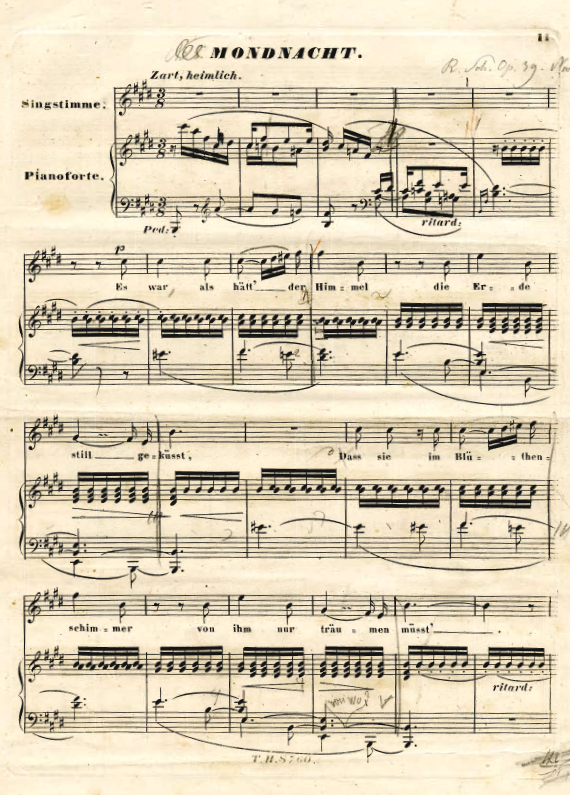Robert Schumann: "Mondnacht" (Moonlight), from Liederkreis, Op. 39 (1840)

Robert Schumann
born 8 June 1810 in Zwickau, Kingdom of Saxony
died 29 July 1856 in Endenich, Rhine Province
Joseph von Eichendorff
born 10 March 1788 at Lubowitz Castle near Ratibor, Upper Silesia
died 26 November 1857 in Neisse, Upper Silesia
Date of origin
of the poem: around 1835, first published in 1837
of the composition: 1840
Notable recordings:
1959: Dietrich Fischer-Dieskau and Gerald Moore
1975: Dietrich Fischer-Dieskau and Christoph Eschenbach
1994: Brigitte Fassbaender and Elisabeth Leonskaja
2007: Christian Gerhaher and Gerold Huber
Mondnacht, from Schumann's Liederkreis op. 39 based on poems by Joseph von Eichendorff, does not normally belong to the genre of sacred music, but what does genre mean in the case of such a brilliant example of Romantic religious song?
In the 19th century in particular, sacred music repeatedly transcended the realm of church music, just as religiosity has always transcended the boundaries of established religions. Religiousness continually liberates itself from the spiritual constraints of religion. Romantic religiousness, as one of the historical forms of religiousness, found particular expression in poetry and music. Schumann's setting of Eichendorff's poem ‘Mondnacht’ is a moving example of such romantic religiousness.
Listen here! (4'44)
Listening companion
Strophe 1
This three-part song is entitled ‘Zart, heimlich’ (Tenderly, secretly). The first two notes in the ninth chord of the piano introduction span four octaves and open up a spiritual space between the earthly and the heavenly. The wandering harmonies immediately give the song a sense of boundlessness, while the fourth and fifth intervals in the bass add a mystical quality.
Then the first verse begins with a pounding heartbeat rhythm, first with a natural B flat, which expands to a C sharp a second later. In F sharp minor, the dominant of E major, the vocal part rises and transforms Eichendorff's subjunctive phrase ‘Es ist, als hätt'...’ (‘It is as if...’) into poetically floating music. Soft repetitions and a further, calm unfolding of the melody create the atmosphere of a romantic self-awareness.
Strophe 2
The piano introduction at the beginning is repeated. The floating sixteenth notes now sound like a gentle night breeze over fields and forests, and once again the melody tends towards the tonic E major from the wandering F sharp minor dominant.
Strophe 3:
The transition from romantic experiences of nature to self-awareness changes the music of the third part. The piano introduction at the beginning is now interwoven as a counterpoint to the emphatically soaring vocal melody. The song does not end on the tonic, but on the mysterious, dissonant quintsixth chord G sharp-B-D-E.
The postlude, however, allows the piano introduction to fade away into the romantic vastness of religious self-awareness.
Mondnacht
Es war, als hätt’ der Himmel,
Die Erde still geküsst,
Dass sie im Blütenschimmer
Von ihm nun träumen müsst’.
Die Luft ging durch die Felder,
Die Ähren wogten sacht,
Es rauschten leis die Wälder,
So sternklar war die Nacht.
Und meine Seele spannte
Weit ihre Flügel aus,
Flog durch die stillen Lande,
Als flöge sie nach Haus.
Moonlit Night
English translation by Richard Stokes